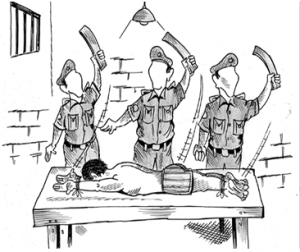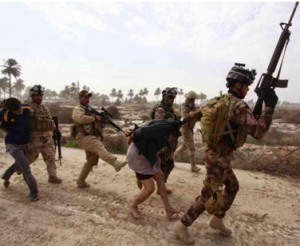In this blog post, Sunidhi, a student of the Rajiv Gandhi National University of Law, Patiala has explained why the government should be made liable to pay compensation to those who are falsely accused of terrorism. The blog post highlights increasing cases of such false accusations. The blog post also highlights all the sufferings that the accused has to undergo in jail and after his/her acquittal.
Terrorism
Terrorism is a crime against the society where the terrorists use or threaten to use violent and life destroying means to obtain their ideological, religious or political aim. It is a major threat to human civilization. It is also considered a war crime under the laws of war when used to target non-combatants, such as civilians, neutral military personnel, or enemy prisoners of war.[1] The terrorists use human fear to achieve their goals.
Incidents of cruelty against innocents
An innocent person has not committed any crime but has undergone the punishment for the crime and then the apex court refuses to grant compensation for all the sufferings he had to undergo. Is this what we expect from our judicial system? Is this how Indian police investigates a case? This is not a fabricated story. This has happened not once or twice but innumerable times. The following are few examples of how innocents were accused of being terrorists and released after being imprisoned for many years:
Six persons who were acquitted in 2002 Akshardham Terrorist Attack case were refused compensation for their ‘wrongful’ arrest by the Supreme Court of India recently. The ground for refusal to entertain the compensation plea was that it would have a “serious demoralizing effect” on the investigating agencies.
9 Muslims men were acquitted in April 2016 in the Malegaon Blast Case of 2016. They were set free after being imprisoned for ten years. There are numerous other examples when innocents have suffered due to the inefficiency of the investigating officers.
Problems faced by those who were falsely accused
Challenges faced in jail
55% of cases lodged in India are against police personnel. So, how do you think will the victims of false accusations be treated in jails? These victims of false accusations have to suffer harassment by police personnel and their jail inmates as they rot in police cells or jails waiting for trial or hearing of appeal till the time they are acquitted. The condition of jails in India is well known to all. They are tortured in jails and forced into self-incrimination.
In 1998, Mohammad Aamir Khan, then 18, was picked up by Delhi Police on charges of terrorism. In 2012, the court acquitted him in 17 out of 19 charges – after Khan had spent 14 years in jail. This is an excerpt of his statement about his days in jail, “I was kept in illegal police detention for seven days where I was tortured – even today, khaki scares me. I have nightmares of police vans chasing me.”[2]
Challenges faced after acquittal
Once the person is accused, our society attaches a tag on him/her that he/she is a terrorist. The media also highlights that these persons tried to kill many innocents, and public feels happy that the government has stopped another terrorist attack and saved the life of many innocent people. But when they are acquitted, no one cares. When these people are released from jail, they don’t get job opportunities. The reason being twofold:
- They still carry the society imposed terrorist tag which makes it impossible for people to trust them.
- Their long stay in jail completely cuts them off from society and changes in technology which makes them unfit for technical and good job offers.
Hence, these people fail to secure the jobs they could have secured if they were not imprisoned and secure a safe and better future for their children and family. The lack of good job opportunities leads to poverty. Poverty leads to dissatisfaction and frustration, which in turn induces them to take revenge from society and they end up committing some crime.
This is another excerpt from Mohammad Aamir Khan’s statement, “In 1998, things were very different. When I was released, technology had become very big – people were using advanced phones, social media, ATMs, metros, etc. I am still learning all this.”[3]
Also, the society does not accept them and people humiliate them repeatedly. It is also doubtful whether their children would study to become IAS officers or become terrorists for the injustice meted out to them or due to poverty and ostracism by the society they live in. The young people whose fathers were branded as terrorists by the society and treated in that very manner are rejected by the society and often their families are harassed in every possible way.
This was what happens with those who get acquitted, but there are also some unlucky victims who are not brought to justice because their matter is decided by the police by shooting them down. One of such cases is the famous case of Ishrat Jahan who was killed in an alleged fake encounter; the reason given was the threat she posed to the Chief Minister of Gujarat. While the recent statements of David Coleman Headley have raised doubts about her innocence, she’s one of those unfortunate few who couldn’t even stand trial.[4]
Right to get compensation for all the sufferings
The Indian Constitution under Article 21 guarantees that all the persons have the fundamental right to live freely. The Right to life includes the right to live with dignity. It also guarantees human rights to all. But what about the human rights and right to live with dignity of the victims who are falsely accused of terrorism?
When a common man insults another person by instituting a legal proceeding against him/her, then he/she can be punished for the offense of malicious prosecution and compensation is awarded accordingly. Then why the government should not be held liable to pay compensation to the victim of false accusations for all the humiliation and sufferings that he/she has to undergo. After all, the government is elected by the people for its welfare but when the government fails it should also be held accountable and made liable to pay compensation.
If the government is made liable to pay compensation for its felony and made accountable, then it will bring efficiency in its working and avoid repetition of such life destructive errors. This will also tighten the grip on the investigating agency to work carefully instead of this having a “serious demoralizing effect” on them as stated by Supreme Court rejecting compensation plea in Akshardham attack case. Hence, the government should be made liable to pay compensation to those falsely accused of terrorism to have a deterring effect and to do justice to the victims for all their sufferings.
Footnotes:
[1] Hoffman, Bruce (1998). Inside Terrorism.Columbia University Press.p. 32.ISBN 0-231-11468-0. See review in “Inside Terrorism.” The New York Times.
[2]Available at http://blogs.timesofindia.indiatimes.com/the-interviews-blog/i-spent-14-years-in-jail-wrongly-accused-of-terror-saw-torture-and-humanity-grateful-for-indias-secular-democracy-mohammad-aamir-khan/, last accessed on July 7, 2016, at 3:33 p.m.
[3]Ibid.
[4]Available at http://www.youthkiawaaz.com/2016/06/terrorism-charge-young-muslims/, last accessed on July 7, 2016.
 Serato DJ Crack 2025Serato DJ PRO Crack
Serato DJ Crack 2025Serato DJ PRO Crack











 Allow notifications
Allow notifications


